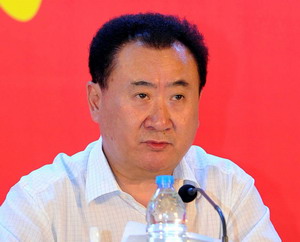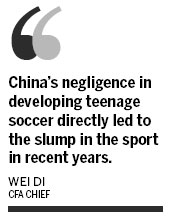Companies
Wanda's 500m yuan to boost Chinese soccer
By Tang Zhe and Yu Yilei (China Daily)
Updated: 2011-07-04 14:07
 |
Large Medium Small |

Wang Jianlin, chairman of Dalian Wanda
Dalian Wanda back CFA's bid to foster young talents with multi-million deal
BEIJING - Fresh from the recent disappointment of its Olympic team failing to qualify for next year's London Games, the Chinese Football Association (CFA) launched a huge salvage campaign on Sunday by reaching a multi-million-dollar deal with a domestic company to support a new youth development program.
Watched by Chinese State Councilor Liu Yandong and Chinese Sports Minister Liu Peng, CFA chief Wei Di signed the comprehensive agreement with Dalian Wanda, a real estate company, at the Beijing Institute of Technology.
According to the contract, Wanda will inject 500 million yuan ($77.3 million) over three years to boost the sport in China in terms of youth development, domestic league upgrading, referee training and inviting world-class foreign coaches to help the men's and women's national teams.
The new partners agreed to put the priority on the development of youth soccer and immediately launched a youth development program called Future Stars.
| ||||
"The progress of Chinese soccer depends on the emergence of high-level young players," said Wei, who took over the CFA in January last year.
"China's negligence in developing teenage soccer directly led to the slump in the sport in recent years."
This is not the first time the CFA has sent young players abroad. In 1993, it dispatched a youth team to Brazil and the five-year training helped to nurture several established players such as Li Tie, a former Everton player, Li Jinyu, a domestic league top scorer, and Li Weifeng, a former national team captain. 
However, after suffering from match-fixing scandals and bribery allegations, which earlier this year led to the arrests of several senior CFA officials and once-notable referees, China's soccer slumped to a new low when its national team failed for the second consecutive time to qualify for the World Cup finals. Its hopes for the 2014 Brazil World Cup also look thin.
As well, its Olympic team did not qualify for the 2012 London Games as its once world-beating women's team did not qualify for the ongoing World Cup in Germany.
Furthermore, the CFA has to face a shameful reality: China had only about 7,000 players under the age of 18 registered with the association at the end of 2010, compared with Japan's 500,000.
Wang Jianlin, chairman of Dalian Wanda, said the company would extend its cooperation with the CFA if Chinese soccer shows signs of bouncing back in three years.
"I have two standards to assess the result of our cooperation," the 56-year-old said after signing the contract with the CFA. "One is the participation level of teenagers in the sport. If China's soccer population increases to 700,000 thousand or 800,000 in three years, then our cooperation will be successful.
"The second standard is the attendance rate at the domestic league. I hope our cooperation will reawaken people's passion for soccer.
"If we make these changes in three years, then we can talk about further cooperation, but if there's no change, I think we will be done there."
China's soccer enjoyed its best time in the early 1990s after Jia-A league, China's highest-tier professional soccer league, was established.
The sport's influence reached a peak in 2001, when the Chinese men's national team secured a berth at the 2002 World Cup finals, which were co-hosted by Japan and South Korea. This was China's first and only appearance at a World Cup final.
| 分享按钮 |



